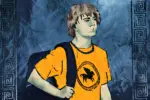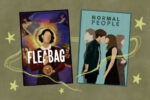Contains Spoilers for “Little Fish”
Many people treasure their special moments with a companion. “From the smell of smoke in Jude’s hair to spending time with close friends,” mentally revisiting these memories always seems possible. Hence, in a world where each person must count down the days until their memory is completely wiped strikes terror into the hearts of viewers.
“I was so sad the day I met you. I can’t remember why.”
“Little Fish,” a science fiction drama directed by Chad Hartigan, tells the story of two people in a world spiraling into doom. Hartigan’s creative adaptation of a short story written in 2011 presents a tragic scenario in which humanity’s memory is slowly fading due to the spread of a memory-loss virus. Ironically, the success of this film about a pandemic was impacted by COVID-19. Though disheartening, this film is an entirely worthy watch, with a 4.5/5 rating on Rotten Tomatoes and a 3.9/5 rating on Letterboxd.
Emma Ryerson (played by Olivia Cooke) and Jude Williams (portrayed by Jack O’Connell) fight to preserve their love against the threat of losing their memories; maintaining their relationship becomes difficult as life uncontrollably changes before their eyes. As their world is actively affected by the Neuro-Inflammatory Affliction (NIA), a fictional memory loss illness, a pandemic ensues similar to that of 2020. Together, Emma and Jude attempt to preserve their love despite their relationship’s impending destruction due to NIA. Although their relationship is fictional, their story will have you rooting for a happy ending. Nevertheless, like any good tragedy, “Little Fish” builds its romantic narrative upon the premise that the end of a relationship is as uncontrollable as it is inevitable.
“Little Fish” opens on with two strangers before transitioning to Emma as she recounts her love story. For the first few minutes of the film, she recalls her budding romance with Jude Williams. The strangers become newlyweds, but their relationship winds up being tested by the world falling apart around them. NIA seems to be taking over their friends and families’ lives, leaving the couple with a countdown to the end of their relationship.
Every moment between them feels intimate, from their touches of affection to the witty dialogue they share. Nevertheless, their doomed fate creeps closer. As expected, the couple is not immune to NIA, and Jude is the first to slowly lose his memory. He begins to miss minor details in daily situations and experiences gaps in his conversations with Emma. The film instills a sense of dread into the viewer with the realization that Jude is slipping away from the loving familiarity he and Emma share.
The musical score, composed by Keegan DeWitt, complements “Little Fish” by elevating the viewer’s emotions as the plot unfolds. From the moment they fall in love, to the moments when Jude’s memories begin to fade, the score feels somber and contributes to the film’s melancholic ambiance. “Let’s Get Married” plays in the background of one of the most emotionally-charged scenes, and the audience’s sensations swirl as they experience the characters’ gut-wrenching sorrow.
One of the most significant moments of the film takes place the same day they purchase a fish, a detail reflected in the film’s title. While in a pet shop surrounded by numerous fish tanks, Jude nonchalantly but romantically asks Emma to marry him. She agrees, and the two embrace one another, solidifying their love as the blue hues of the tanks reflect onto their bodies. The moment they decide to spend their life together represents the calm before the storm.
The attention to detail in “Little Fish” is immaculate. Haptic memory, memory associated with the sense of touch, serves as as a major motif throughout the film. In one poignant scene, Emma and Jude share an intimate moment that’s accompanied by the looming worry that Jude may soon forget any touch they previously shared. The screen splits, with half the screen showing their embrace and the other half focusing on Jude lovingly dragging his fingers down Emma’s body. The loving caresses transition to the next scene, but the lingering feeling of their time running out persists.
As expected, Jude and Emma both lose their memories. Although this all transpires toward the end of the film, it is the final moments that confirm they’ve forgotten one another. Despite their loss of memory being involuntary, this concept feels vaguely similar to “Eternal Sunshine of the Spotless Mind.” A close watch of “Little Fish” indicates that true love can find hope. Despite memory erasure or the misfortune of NIA, two soulmates will somehow find their way back to one another.
Only then does this line make sense: “I was so sad the day I met you. I can’t remember why.”
Although “Little Fish” is a tragic film, it’s one worth watching and should be deeply appreciated. Similar to the world during COVID-19, this fictional world is one where individuals struggle to find a cure — except this one would restore their memories. In a global battle against the NIA, the return to normalcy is unreachable, and witnessing the love between two individuals slowly fade away feels disheartening.
You can witness Emma and Jude’s tragic yet hopeful story on Hulu. Stop whatever you’re doing and go stream this movie now. Only then will you understand the minute details of the film, like Jude and Emma’s matching fish tattoos on their ankles. However, be prepared to become emotionally invested and possibly cry as “Little Fish” unravels.

















